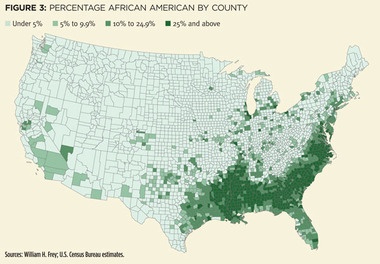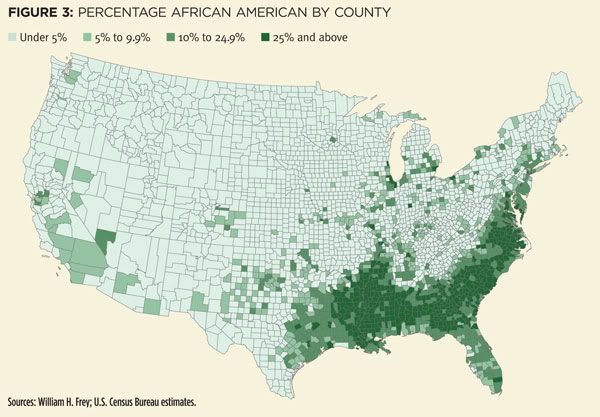Black Belt Power: African-Americans come back South, change political landscape

During the turbulent 1960s, black population growth ground to a halt in the South, and Southern states claimed less than 10 percent of the national increase then. The South has increasingly claimed a greater share of black population growth since -- about half the country's total in the 1970s, two-thirds in the 1990s and three-quarters in the decade that just ended.The shift could significantly strengthen the political power of African-Americans in the South, especially in the historic Black Belt stretching from the mid-Atlantic to east Texas. Here's a map showing where the South's growing African-American communities are concentrated, according to the latest Census data:
 A glimpse of the political force this represents was seen in 2008, when record-breaking African-American turnout helped push Florida, North Carolina and Virginia into blue territory.It's also seen in Georgia, the epicenter of the Black Belt, where the African-American community grew by more than 579,000 since 2000 -- the leading ingredient in making it the seventh-fastest growing state in the country.The 2010 Census also offers a glimpse of how Southern African-American communities are changing. Atlanta echoes a trend found across the South and country, where suburban black neighborhoods are growing at the expense of the urban core. The New York Times notes that "just 2 percent of the black population growth in the last decade occurred in counties that have traditionally been black population centers."African-Americans moving South also tend to be young: 40 percent of those moving to Southern states in the 2010 Census count were ages 21 to 40. Meaning that the political force of the latest phase of African-American reverse-migration South will be felt for years to come.* The U.S. Census definition of "the South" includes Alabama, Arkansas, D.C., Delaware, Florida, Georgia, Kentucky, Louisiana, Maryland, Mississippi, North Carolina, Oklahoma, South Carolina, Tennessee, Texas, Virginia and West Virginia. The Institute for Southern Studies typically does not include DC, DE, MD and OK in its definition.
A glimpse of the political force this represents was seen in 2008, when record-breaking African-American turnout helped push Florida, North Carolina and Virginia into blue territory.It's also seen in Georgia, the epicenter of the Black Belt, where the African-American community grew by more than 579,000 since 2000 -- the leading ingredient in making it the seventh-fastest growing state in the country.The 2010 Census also offers a glimpse of how Southern African-American communities are changing. Atlanta echoes a trend found across the South and country, where suburban black neighborhoods are growing at the expense of the urban core. The New York Times notes that "just 2 percent of the black population growth in the last decade occurred in counties that have traditionally been black population centers."African-Americans moving South also tend to be young: 40 percent of those moving to Southern states in the 2010 Census count were ages 21 to 40. Meaning that the political force of the latest phase of African-American reverse-migration South will be felt for years to come.* The U.S. Census definition of "the South" includes Alabama, Arkansas, D.C., Delaware, Florida, Georgia, Kentucky, Louisiana, Maryland, Mississippi, North Carolina, Oklahoma, South Carolina, Tennessee, Texas, Virginia and West Virginia. The Institute for Southern Studies typically does not include DC, DE, MD and OK in its definition.
Tags
Chris Kromm
Chris Kromm is executive director of the Institute for Southern Studies and publisher of the Institute's online magazine, Facing South.
